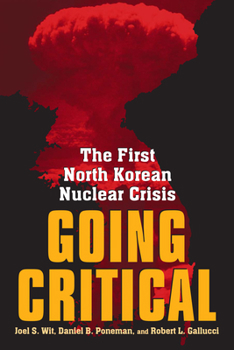Going Critical: The First North Korean Nuclear Crisis
Select Format
Select Condition 
Book Overview
A decade before being proclaimed part of the ""axis of evil,"" North Korea raised alarms in Washington, Seoul, and Tokyo as the pace of its clandestine nuclear weapons program mounted. When confronted by evidence of its deception in 1993, Pyongyang abruptly announced its intention to become the first nation ever to withdraw from the Nuclear Non-Proliferation Treaty, defying its earlier commitments to submit its nuclear activities to full international inspections. U.S. intelligence had revealed evidence of a robust plutonium production program. Unconstrained, North Korea's nuclear factory would soon be capable of building about thirty Nagasaki-sized nuclear weapons annually. The resulting arsenal would directly threaten the security of the United States and its allies, while tempting cash-starved North Korea to export its deadly wares to America's most bitter adversaries. In Go ing Critical, three former U.S. officials who played key roles in the nuclear crisis trace the intense efforts that led North Korea to freeze--and pledge ultimately to dismantle--its dangerous plutonium production program under international inspection, while the storm clouds of a second Korean War gathered. Drawing on international government documents, memoranda, cables, and notes, the authors chronicle the complex web of diplomacy--from Seoul, Tokyo, and Beijing to Geneva, Moscow, and Vienna and back again--that led to the negotiation of the 1994 Agreed Framework intended to resolve this nuclear standoff. They also explore the challenge of weaving together the military, economic, and diplomatic instruments employed to persuade North Korea to accept significant constraints on its nuclear activities, while deterring rather than provoking a violent North Korean response. Some ten years after these intense negotiations, the Agreed Framework lies abandoned. North Korea claims to possess some nuclear weapons, while threatening to produce even more. The story of the 1994 confrontatio"





